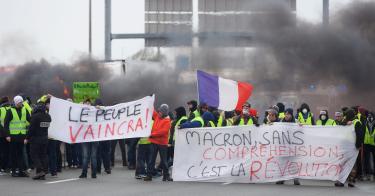To help meet its carbon reduction goals under the 2015 Paris Climate Agreement, the French government announced it would add on to its already high fuel taxes. The ploy has backfired.
France is now in its second week of protests, which began in rural areas and now have stricken the very the heart of Paris. Last weekend’s violent riots the worst central Paris has seen since 1968, and the worst the country has seen since 2005.
While fuel taxes sparked the outcry, the demonstrations quickly morphed into a general anti-government protest. There is widespread anger — especially in rural areas — at being left behind, economically, by the ruling elite, who can more readily bear the cost of Macron’s green agenda.
An amalgam of far-left and far-right actors have opportunistically utilized the protests to spread anarchy and violence.
On Saturday, 36,000 people took part in the Gilets Jaunes or “yellow vests” protests, most wearing the bright jackets which every vehicle in France must contain.
Rioting in Paris injured 133 people including 23 police officers. There were 412 arrests. Cars were torched, stores looted, and the iconic Arc de Triomphe, containing France’s tomb of the Unknown Soldier at its base, vandalized.
Graffiti on the Arc read “Macron resign” and “Yellow vests will triumph” There were more incendiary writings, too: “Topple the bourgeoisie” and “We cut off heads for less than this.”
Returning early from the G20 in Argentina, President Macron sought to diffuse the protests by announcing a six-month delay for the fuel tax. He also reportedly asked Prime Minister Edouard Philippe to meet with leaders of the Gilets Jaunes.
Mr. Macron won the presidency just last year. He ran as an Independent, trumpeting a platform of social liberalism, European integration, reforming the welfare and pension systems, and tackling climate change.
In June 2017, just a few weeks into his presidency, Mr. Macron criticized President Trump’s decision to withdraw the United States from the Paris Climate Agreement proclaiming, “Make our planet great again,” and publically invited U.S. scientists and entrepreneurs focusing on climate change to work in France.
At the time, Mr. Macron enjoyed a 66 percent approval rating. Today, it stands at 23 percent. Mr. Macron’s cheeky self-assuredness has dissolved in the face of protests and weekend rioting.
The French economy grew by merely 1.8 percent in 2017, unemployment is at 8.1 percent, but is far higher in rural France and amongst the nation’s youth.
President Macron’s new fuel taxes are meant to incentivize reduced fossil fuel consumption in service of Macron’s green agenda. But fuel taxes in France were already some of the highest in Europe, and the cost of diesel fuel, which powers most French vehicles, had already risen 23 percent over the past year. The poorer and rural French have suffered the most.
As a result, Mr. Macron is increasingly viewed as being out of touch with large swaths of the country. The new fuel taxes would have added 6.5 cents per liter of diesel and 2.9 cents per liter of gasoline on January 1. Those extra costs proved explosive.
And Mr. Macron’s budget-breaking green agenda doesn’t stop there. His government also has proposed closing up to 17 nuclear reactors by 2025. Nuclear currently supplies 75 percent of French electricity needs. Replacement power sources are sure to be far more expensive.
Germany, which decided in 2011 to shutter its 17 nuclear power plants by 2022 as part of its Energiewende, or energy transition has seen increased household electricity prices as a result.
While the weekend’s rioting has quieted down, businesses in France are left with losses. French Finance Minister Bruno Le Maire stated on Monday: “The impact is severe and ongoing.” Parisian hotel reservations, for example, were down 15 to 25 percent, with retailers and restaurants reportedly faring even worse.
Will Mr. Macron’s six-month reprieve of the tax hike be enough to assuage the Gilets Jaunes? That remains to be seen.
The Gilets Jaunes protests that began in mid-November come for Mr. Macron on the heels of a summer scandal following the release of a film showing one of his personal bodyguards beating a protestor.
What seems more certain is that Mr. Macron will have a hard time regaining popularity, especially amongst those sectors who feel left behind. The protests will likely also endanger planned economic reforms to make the French economy more competitive, which Mr. Macron also ran on.
French motorists are loathe to continue pay the price for Mr. Macron’s climate agenda. And those who feel forgotten will continue to resent the man in the Elysee Palace.
Civil unrest may or may not spring up again, but radical groups on the extremes of the political spectrum will most certainly try to accelerate protests into destabilizing rioting, looting, and mayhem.
President Macron could be in for a long winter.
This piece originally appeared in The Washington Times



